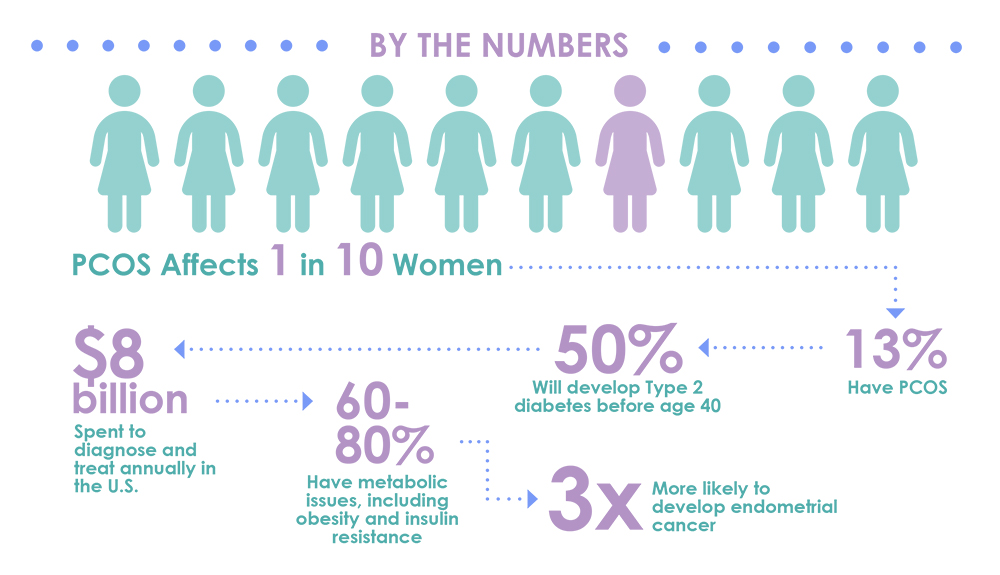The 411 on PCOS
April 2, 2025
Today, women wear a lot of different hats: wife, executive, volunteer, mom. And with each role you fulfill, comes a whole host of responsibilities that require you to be at your very best. So, when bothersome symptoms stand in your way, like irregular periods you can’t plan for or painful acne that shakes your confidence, it’s easy to feel less than.
But girl, you’ve got this! Not only is there a likely medical explanation for your symptoms; there are also easy-to-implement treatments that can help you be “all the things,” to all the people who count on you.
What is PCOS?
Polycystic ovary syndrome (PCOS) is a common condition that can run in families, and it affects up to 10% of reproductive-age women. PCOS is a hormonal imbalance (higher-than-normal testosterone levels). It can lead to symptoms from mild, like irregular periods, to more serious, like cysts on your ovaries. And in some cases, it can even keep you from ovulating.
You may have PCOS if you experience two or more of these symptoms.
- Abnormal hair growth: PCOS can cause coarse hair to pop up in un-lady-like places — like your face, back, arms or chest. It can also cause male-pattern hair loss.
- Fertility issues: PCOS can stop many of your eggs from fully maturing, making it harder for you to get pregnant. And sometimes, your ovaries won’t release an egg every month as it should.
- Painful acne: PCOS comes with high testosterone levels and the presence of other male hormones that can lead to deep acne, mainly along your jawline.
- Period problems: PCOS often causes irregular periods. In fact, you may have fewer than nine periods a year and go more than 35 days between cycles. As a result, your uterine lining — the tissue you shed during menstruation — will get thicker, making your periods heavier and longer.
- Problematic cysts: PCOS can cause small fluid-filled sacs (cysts) to develop on your ovaries that may or may not be painful. So, it’s quite possible to have ovarian cysts and not even know it.
Diagnosing and Treating PCOS
It takes lab tests, a physical exam and sometimes an ultrasound to diagnose PCOS (or rule out other problems). And while there’s no cure for it, there is a lot we can do to help you manage the symptoms that are keeping you from living your best life.
It's also important to understand that going too long between periods can increase your cancer risk, and PCOS is linked to serious medical conditions like anxiety, depression, diabetes, heart attack, high blood pressure, sleep apnea, stroke and more.
Keeping up with your preventive health screenings and talking with a doctor if you believe you have PCOS is key to safeguarding your overall health. Your provider can create a treatment plan that addresses your unique needs and concerns — and puts you on a path toward healing.

Related Articles

November 7, 2024
10000 Steps Good Enough
How many steps did you log today? It’s a popular question, and the gold standard answer is 10,000. Yet, depending on your health goals, you may need to pick up the pace.

June 1, 2019
5 Day Meal Prep
Who says eating healthy has to be difficult? One of our Registered Dietitians shows us how easy it can be to prep lunches for a busy week.

June 1, 2019
5 Foods With Health Benefits
Dark ChocolateBoost your mood and your memory (think antioxidants) by savoring dark chocolate. It may also help your heart health. Just 1 oz. is all it takes...

December 9, 2019
5 Free Indulgences
Are you ready for the hubbub of the holidays? The season’s festivities are always fun, but they can also wear you down. If your holiday spirit needs rechargi...

June 1, 2019
5 Minutes to a Happier You
Feeling stressed, angry or anxious? Head to the great outdoors. A new study has found that a five-minute walk can work wonders for your mood.The more natural...

July 27, 2022
5 Must Have Nutrients
Vitamins and minerals do a body good, but who has time to figure out which foods offer what benefits? This short list of five essential nutrients, opens new ...


